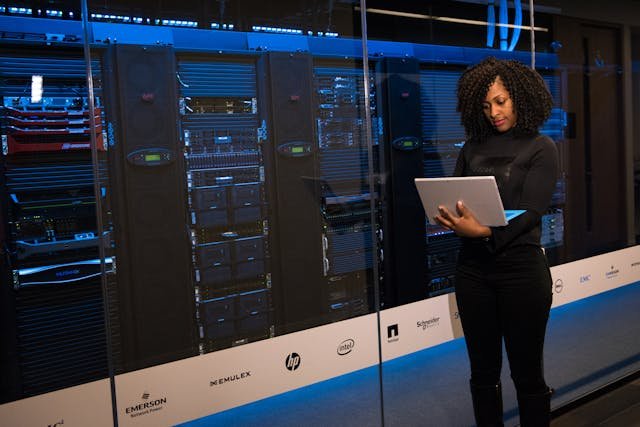Transform Business Processes Successfully with Dig...
In today’s fast-evolving digital landscape, businesses must adapt quickly to remain competitive. Digital Process Operations (DPO) is at the heart of this transformation, enab...

As we move deeper into 2025, the data center industry is undergoing rapid transformation. Driven by surging demand for artificial intelligence (AI), cloud computing, and sustainability, data centers are evolving to become more powerful, efficient, and secure than ever before. For business leaders, understanding these trends is crucial to staying ahead in a digital-first world.
1. AI and High-Performance Computing Take Center Stage
AI workloads are fundamentally reshaping data center design and operation. The explosive growth of generative AI, machine learning, and real-time analytics is driving demand for high-density compute environments. Data centers are now being built or retrofitted to accommodate powerful GPUs and specialized hardware, enabling faster training and inference of AI models. This shift is not just technical—it’s strategic, as organizations look to leverage AI for competitive advantage.
2. Edge Computing for Real-Time Processing
With the rise of Internet of Things (IoT) devices and latency-sensitive applications, edge computing is becoming a critical part of the data center landscape. Instead of relying solely on centralized facilities, businesses are deploying smaller, decentralized data centers closer to end users. This approach reduces latency, improves responsiveness, and supports real-time data processing for applications like autonomous vehicles, smart cities, and industrial automation.
3. Sustainability and Energy Efficiency
Sustainability is now a top priority for data center operators. The industry faces mounting pressure to reduce its environmental footprint as energy consumption soars—especially with AI workloads consuming up to ten times more power than traditional services. Operators are investing in renewable energy sources, optimizing resource utilization, and adopting advanced cooling solutions like liquid cooling to handle high-density equipment while minimizing energy use.
4. Liquid Cooling Revolution
Traditional air cooling is no longer sufficient for today’s high-performance data centers. Liquid cooling, including direct-to-chip and immersion cooling, is rapidly gaining traction. These technologies offer significant improvements in energy efficiency and allow for higher rack densities, making them essential for supporting AI and other compute-intensive tasks.
5. Security and Compliance
As cyber threats become more sophisticated and regulations tighten, data center security is under the spotlight. Enhanced security measures—such as Zero Trust architectures, improved physical security, and compliance with regional data protection laws—are becoming standard. Businesses are also adopting AI-driven monitoring tools to detect and respond to threats in real time.
6. Hybrid and Multi-Cloud Strategies
Flexibility and resilience are key in 2025. Organizations are increasingly adopting hybrid and multi-cloud strategies, combining on-premises, public, and private cloud resources. This approach allows businesses to optimize costs, improve scalability, and ensure business continuity, even as workloads become more complex and distributed.
7. Hyperscale and Specialized Data Centers
Hyperscalers—large cloud providers and tech giants—are driving much of the industry’s growth, building massive data center campuses near renewable energy sources. At the same time, smaller operators are finding opportunities in specialized markets, such as compliance-heavy workloads, low-latency edge deployments, and regional colocation facilities.
8. Workforce and Operational Innovation
The demand for skilled data center professionals continues to rise, with a global talent gap projected for years to come. To address operational complexity, operators are leveraging AI-driven management tools for predictive maintenance, resource optimization, and automated workflows. This not only boosts efficiency but also helps attract and retain top talent.
9. Quantum Computing on the Horizon
While still emerging, quantum computing is beginning to influence data center planning. Forward-thinking operators are exploring how to integrate quantum hardware and support hybrid classical-quantum workloads, preparing for a future where quantum computing becomes commercially viable.
At the end, the data center industry in 2025 stands at the intersection of unprecedented opportunity and challenge. From AI-driven innovation and edge computing to sustainability and security, the trends shaping this space are redefining how businesses operate and compete. By staying informed and adapting to these changes, business leaders can ensure their organizations remain agile, efficient, and future-ready in a rapidly evolving digital landscape
Explore more articles related to AI and software development

In today’s fast-evolving digital landscape, businesses must adapt quickly to remain competitive. Digital Process Operations (DPO) is at the heart of this transformation, enab...

As we move deeper into 2025, the data center industry is undergoing rapid transformation. Driven by surging demand for artificial intelligence (AI), cloud computing, and sustainabi...

Explore how artificial intelligence is revolutionizing software development practices and improving efficiency...